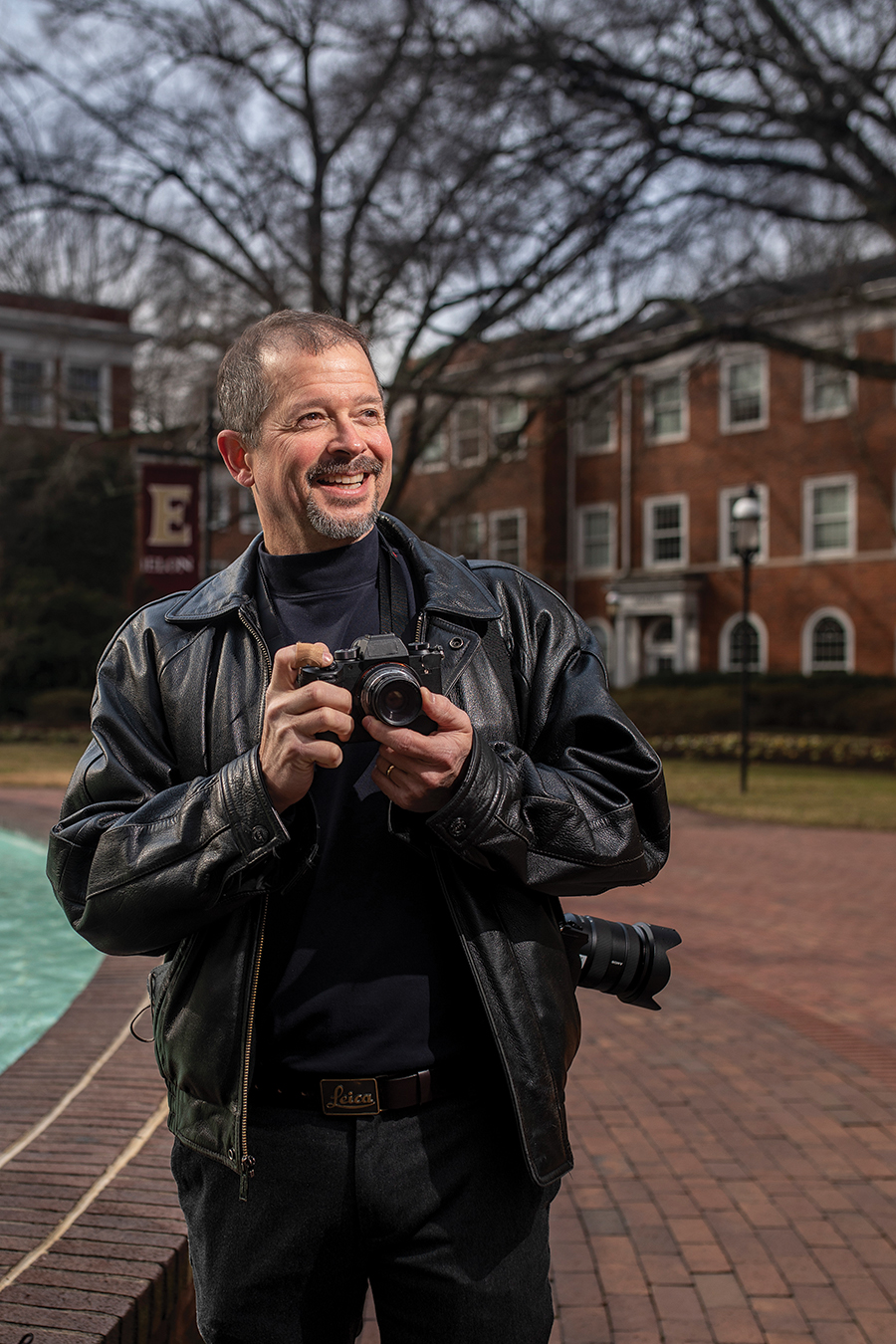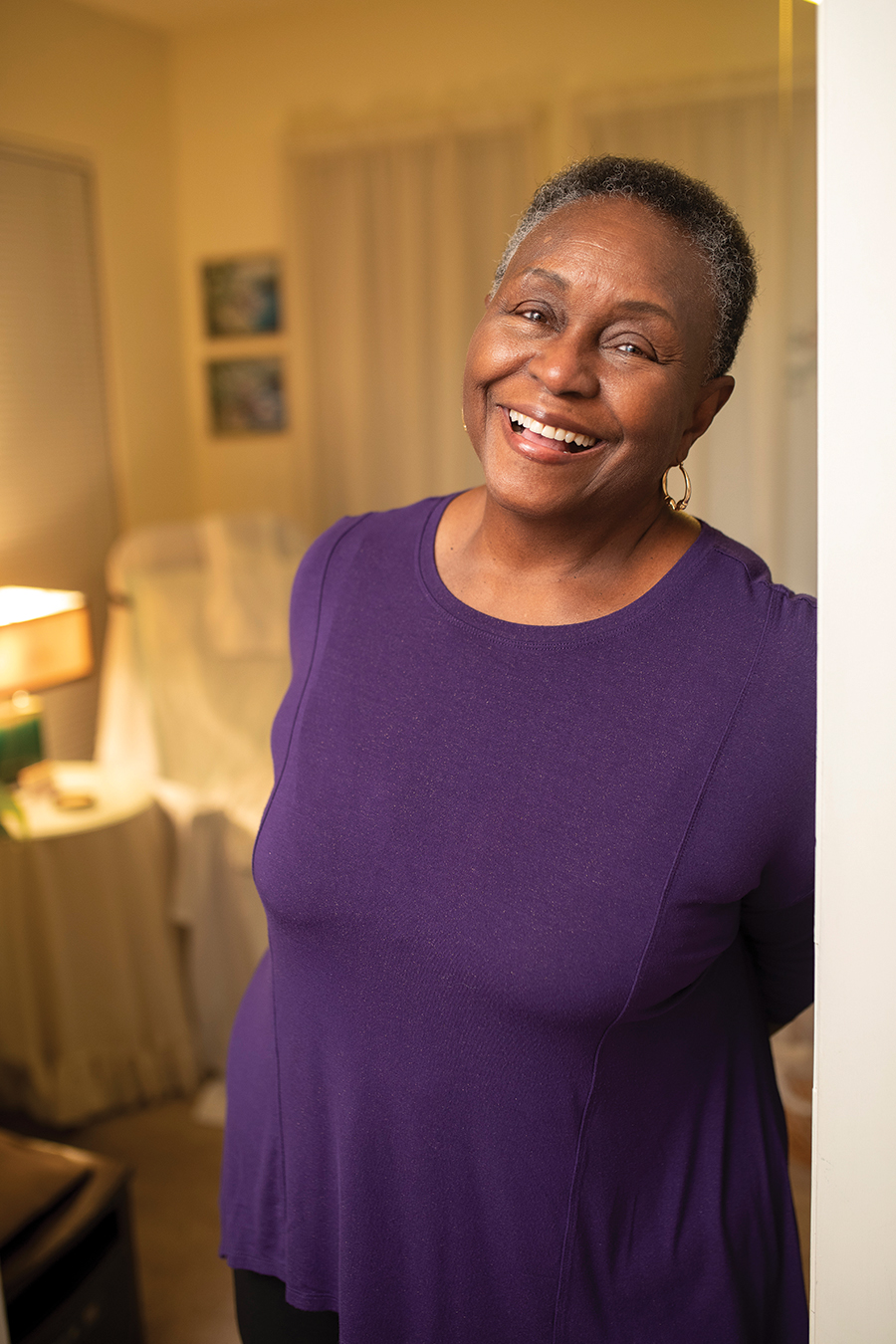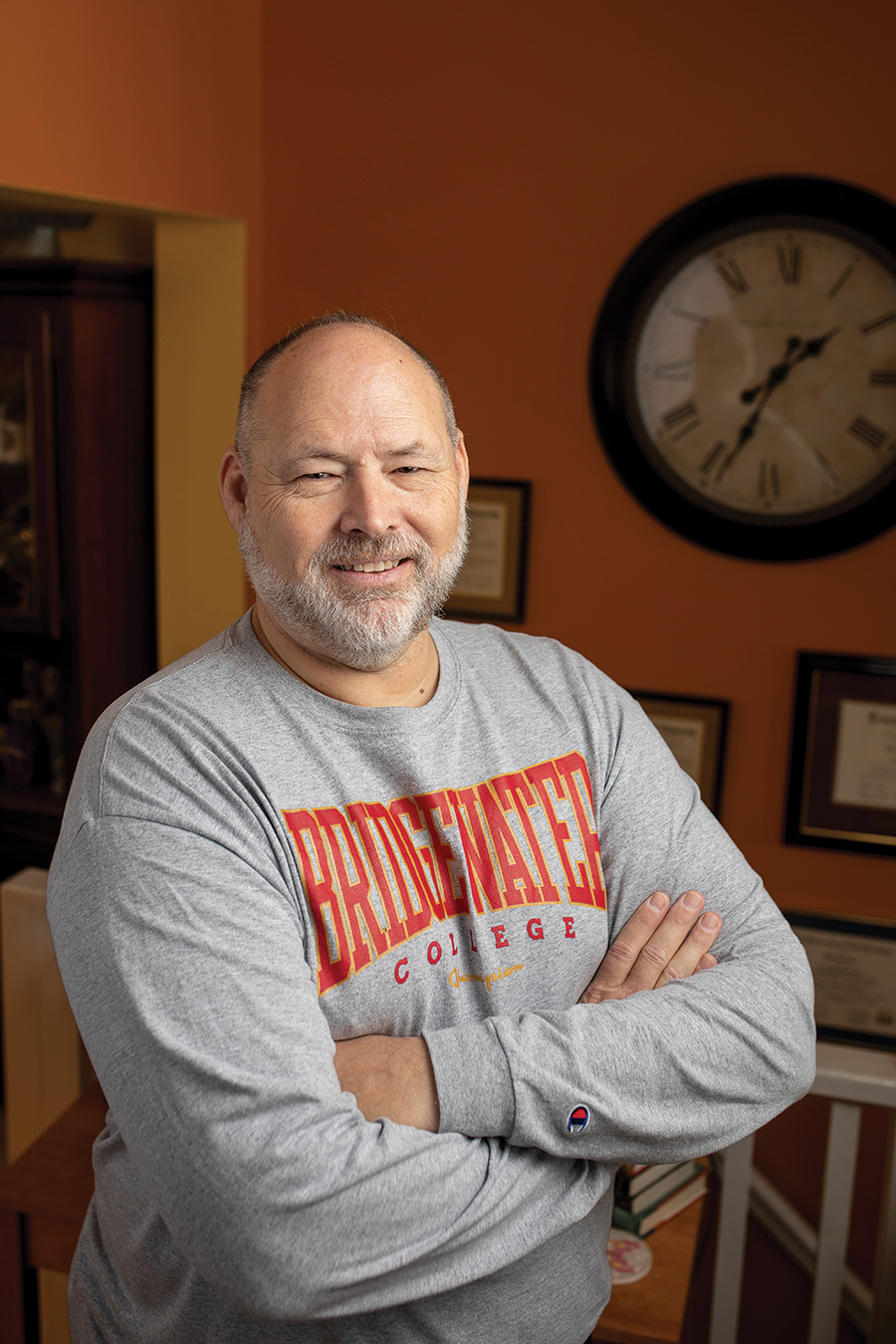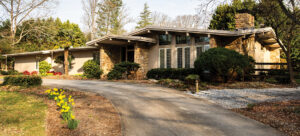
Rob Brown
Finding the Promised Land
As told to Ross Howell Jr. • Photograph by Bert VanderVeen

When I was in fourth grade, my dad — who at 84 is still a Richmond Times-Dispatch photographer — took me to a football game between VMI and the College of William & Mary. He hung a camera around my neck, got me a press pass and told me to see what I could do.
I got a picture of a guy scoring a touchdown, which ran in the Times-Dispatch. The paper paid me $5.
I was hooked.
But when I graduated from high school, I didn’t see photography as a real job. So, I apprenticed with a brick layer. Later, I went to Longwood University, playing basketball in the summer with a guy named Leger Meyland. He was going to photo school and convinced me to go, too. He has been a mentor and friend for 40 years now.
After a year at Randolph Community College, I got a job at the Radford News Journal. Then I came here to Greensboro to work at the News & Record, where I met my wife, Lane. After she got a job in Chicago, we moved there. I found work at The Times of Northwest Indiana, a suburban newspaper.
We had kids and decided to move to Baltimore to be closer to our families. Lane landed a full-time job at The Baltimore Sun. I was a freelance photographer and stay-at-home dad.
When we learned the News & Record was looking for a director of photography, I applied. They took a chance on me, even though my only management experience was raising kids.
In 2015, when I was laid off from the paper, I felt spurned. For a while, I freelanced. Then I put my cameras away, rarely taking pictures.
I decided I’d try something completely different.
I signed up for brewing school at Rockingham County Community College, then got an entry-level job with Natty Greene’s Brewing Co. I was putting beer bottles in boxes in a cold warehouse. Eventually, I was trained to work in the cellar, and later, I handled brewing.
Then I went to Foothills Brewing in Winston-Salem. My work there also was very physical.
I realized brewing is a younger man’s game. So, I decided I’d give computer security a try.
After about two months of study at Guilford Technical Community College, COVID hit.
All my classes went virtual, except for geology. Even though I’d made the president’s list and was six hours away from my associate’s degree, I was feeling very isolated.
I knew when I finished, I’d be starting at ground level again. Worse, I’d be working with 19-year-olds who were real computer whizzes compared with me.
Because my son was getting married, I’d been helping him look for a wedding photographer online.
One evening, I was talking with Lane.
I showed her a photographer’s site and said, “Looking at these photos makes me want to take pictures again.”
And she asked, “Why don’t you?”
So, I got back into freelance photography. After about three months, I heard that the Elon University communications department was looking for a photographer.
I applied and got the job.
Now, I’m back to doing something I love and something I’m good at.
For years I was wandering in the desert and now I’ve found the Promised Land. I couldn’t have done it without Lane. OH
A longtime writer for O.Henry, Ross Howell Jr. is doing research for a second historical novel.
Jessie Sloan
Landing on Her Feet
By Cynthia Adams • Photograph by Bert VanderVeen

For such a sunny personality, Jessie Sloan, a Shreveport, Louisiana, native, had a surprising first job after college — making bombs at the Louisiana Ordinance Plant.
“I was making 2.2 mortar shells, putting the mechanism on the back of the shells that made it propel.”
She also began hair-raising work as a cosmetologist — her mother having advised her to always have a side gig.
Next, Sloan vetted materials for Lucent Technologies in Shreveport, with top security clearances. (“If I did not approve it, they would not purchase it.”)
After 27 years, she “woke up one morning and, noting a Lucent posting in Greensboro, decided I wanted to see how the other part of the world lived.”
In a lickety-split, Sloan transferred.
Sloan remained in top clearance work — secure telephones for the White House and transatlantic junction cables.
Whenever she saw the President using a White House phone, she thought, “I had a hand in that. Oh, my goodness!”
Ever mindful (“My mama always told me, never settle for one thing. Have an A, B and C. I’ve always had more than one job”), she earned her N.C. license, resumed work in a beauty salon — and still worked for Lucent. Two years later in 1997, Lucent closed the Greensboro facility. Sloan retired.
For a while, she traveled, unable to do hair given a knee replacement. “I had to find something else!”
She laughs. “I don’t let anything get me down. I keep a positive attitude.”
A Louisiana podiatrist first introduced Sloan to reflexology. “If I had any sore places, he would massage a certain area on my foot, and the pain would go away.” She told him how she loved giving foot massages. He lent Sloan his books.
“One night I was in bed and said, ‘Well, Lord, what can I do?’ The Lord said, in my mind, ‘Do feet! You enjoy doing feet.’ I got up that morning and found a school.”
For a year, Sloan studied reflexology at Natural Touch Massage School, completing studies and clinical work in 2005.
She registered her business, Soles by Sloan, working at a State Street salon (plan A). Sloan advertised, appeared at health fairs and built a reflexology practice, which she later moved to her home.
Does she absorb the energy of clients as she works?
“You do. You’re transferring your energy to that person. And absorbing all that drains you,” she says.
Meanwhile she worked for Sears 14 years — plan B — in data entry.
Sloan giggles.
“A friend said, ‘You’re not from this planet. You’re not from here.’ I would say, ‘I am too from here! God made me, and He made me this way!’ So many things have happened to me that were unexplained. It’s amazing.”
Today, Sloan’s primary work remains reflexology. But, always, there’s a plan B. Last August she began working with special-needs children on school buses. She arrives at the terminal before 6 a.m.
“I keep them in their bus seats to be sure they don’t get up and hurt themselves. Help them off and on and help with their seat belts. It’s really rewarding.”
This repeats in the afternoon. Sloan returns after lunch to assist again, riding with the children, soothing them, and is home before 5 p.m.
“I’m learning to be thankful, patient. Learning to be caring. Understanding. To work with kids,” Sloan says. “I’ve always wanted to do it.”
She ends the call, preparing for a reflexology session.
“Reflexology is my first love. That is just part of me. That, I always tell people, is my calling.” OH
Chris Hayes
Learning Lessons from COVID
By Maria Johnson • Photograph by Bert VanderVeen

Early one Sunday morning, after wrapping up his 7 a.m. to 7 p.m. shift in the intensive care unit of Greensboro’s Moses H. Cone Memorial Hospital, registered nurse Chris Hayes sniffs out the charge nurse, hands over a handful of badges and tags, and walks out of the Greensboro hospital in his blue scrubs for the last time.
The next afternoon, he sits in a sparsely populated Panera restaurant, sipping a cola and absorbing the new reality of his retirement.
“It hasn’t sunken in yet,” the 56-year-old Hayes says.
Bearded, burly and athletic, with sports sunglasses parked atop his closely cropped hair, the former high school wrestler explains why he left his beloved profession in January, after nearly 32 years.
It’s true, he says, he’d been thinking about retiring to have more time to travel and work on projects around the house.
The accelerator, he says, was COVID.
Specifically, one young man with COVID.
Chris cared for him last summer.
The kid — a college student with no history of health problems — had been moved to the ICU because his oxygen levels were falling. Chris saw him only one night. The kid was conscious, alert and talking through an oxygen mask.
And even though Chris had told himself — after doing it once early in his career — that he’d never get attached to a patient again, he connected with this young man.
“I could see my daughter there,” Chris says, eyes welling at the thought of his younger child, also a college student.
That night, the young man — who was not yet eligible for a vaccine because of his age — crumped.
That’s nurse-talk for took a sudden turn for the worse.
They put him on a ventilator to help him breathe. He stayed on the machine for three weeks.
One morning, when Chris was at home, he got a text from a colleague. They’d lost the kid.
“I about threw my phone through the wall,” Chris says. “It was anger, just anger wishing it had never happened.”
His anger surged at other times, too, especially when dealing with older, unvaccinated patients.
“Probably the hardest thing was listening to people when they were dying, saying they wish they had [gotten the vaccine],” he says.
The idea of retiring grew sweeter when his wife, Jamie, left her job. She’d also worked nearly 32 years as a public school teacher. She, too, was pushed out by COVID and the overwhelming demands it placed on educators.
They both were seasoned veterans with thick skins, Chris says, but COVID had found their breaking points.
“Everybody has one,” he says. “Anyone who tells you they don’t is lying.”
Still, he says he harbors no hard feelings about his pandemic experience.
“I’m probably smiling because it made me retire early,” he says.
Eventually, he adds, he’ll look for another job — a low-stress, part-time gig — maybe in landscaping or in a big-box hardware store, where he can get a discount to furnish his garage workshop. Lately, he has been building coffee tables, TV stands and end tables for his daughters and their friends.
Before the next job search, though, he’ll take several months to scratch some items off his to-do list: going to an Eagles concert with his wife; taking two cruises with his family (one to celebrate older daughter Rebecca’s graduation from pharmacy school); and attending every fall volleyball game of his younger daughter, Grace, a senior at Bridgewater College in Virginia.
One of Grace’s teammates had COVID in 2020 and developed a seizure disorder afterward. The teammate recovered and played again, Chris says, but seeing people who are younger and stronger than he is get seriously ill with COVID was not lost on him.
“Noticing that young people are not immune to all of this has taught me that life is precious,” he says. “It’s time to get out and enjoy it.” OH





